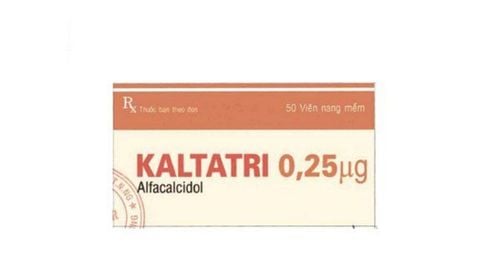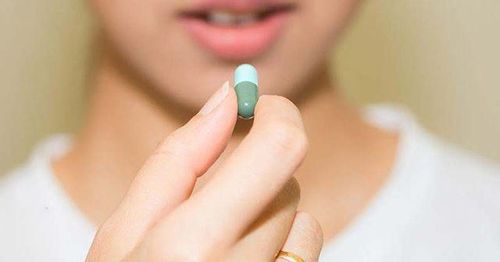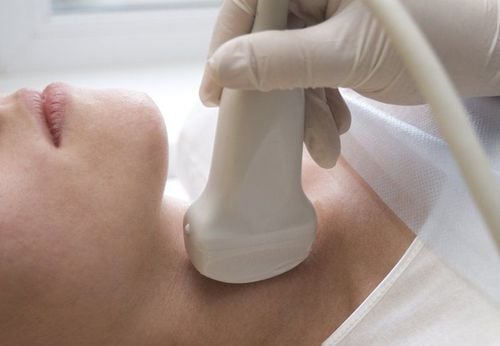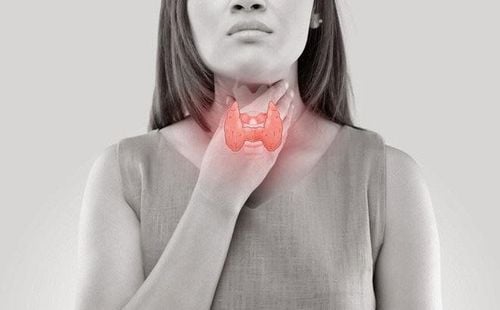This is an automatically translated article.
The article was professionally consulted with General Internal Medicine Doctor - Department of Examination & Internal Medicine - Vinmec Nha Trang International General Hospital.Postpartum thyroiditis is a disease that occurs in about 5-7% of women after giving birth. Because it occurs in the early postpartum period, the signs of the disease are less concerned or misunderstood that the mother is stressed during the time of taking care of her baby. This makes patients miss the opportunity for early detection and effective treatment.
1. Overview of postpartum thyroiditis
Postpartum thyroiditis is a thyroid disorder in women. This is an inflammatory process of the thyroid gland that occurs during the first year after a woman gives birth when the thyroid gland was previously completely normal. Thyroid disease in this woman is not uncommon but can easily be confused with stress or postpartum psychosis.In most women with postpartum thyroiditis, thyroid function returns to normal about 12-18 months after the first symptoms appear. However, there are also some complications that require long-term treatment.
2. Causes of postpartum thyroiditis

Những phụ nữ mắc bệnh thường có nồng độ kháng thể kháng giáp cao hơn bình thường trong giai đoạn mang thai và sau khi sinh
However, many studies show that women with the disease often have higher-than-normal levels of anti-thyroid antibodies during pregnancy and after giving birth. Therefore, doctors assume that postpartum thyroiditis is due to some autoimmune thyroid disease. During pregnancy, a dysfunctional immune system is a factor in outbreaks of the disease. Patients with a family history of autoimmune thyroid disease are also at increased risk of developing thyroid disorders after childbirth.
Besides, people with gestational thyroid disorders are also prone to thyroid disorders in the postpartum period.
3. Symptoms of postpartum thyroiditis

Mệt mỏi, mất ngủ có thể là triệu chứng do tuyến giáp bị viêm
In the first phase, the thyroid gland is inflamed, producing a lot of thyroid hormone, causing symptoms of hyperthyroidism such as:
Fatigue, insomnia; Anxiety, anger easily; irritable Menstrual irregularities; Muscle tremors, fast and strong heartbeat; Unexplained weight loss; Voice change; Hearing loss and sexual desire; These symptoms usually occur 1 - 4 months after giving birth, lasting about 1 - 3 months. However, because they occur in the early postpartum period, these symptoms are rarely cared for or misunderstood as a result of maternal stress during childcare.
After that, thyroid cells become underactive, do not produce enough hormones needed by the body, leading to phase 2 with manifestations of hypothyroidism such as:
Menstrual disorders Fatigue, fatigue Weight gain Constipation; Dry, brittle skin and hair; Scare cold; Poor concentration. Symptoms of hypothyroidism occur 4 to 8 months after birth and can persist for 9 to 12 months. However, sometimes postpartum thyroiditis presents only as hyperthyroidism or hypothyroidism, but not always in the 2-phase sequence as above.
Although causing a lot of trouble, statistics show that up to 80% of women with thyroid disorders return to normal after about 1 year without treatment. Those who don't get better over time can face complications like heart disease, brittle bones or vision problems. More seriously, prolonged postpartum thyroiditis can also affect sexual fertility because it inhibits ovulation.
4. Prevention of postpartum thyroiditis
Women who have a history of thyroid disorders will be advised by their doctors on an appropriate diet to prevent postpartum thyroiditis. And for those who want to prevent postpartum thyroid disorders, the following methods can be applied:4.1 Eat properly. Add more fruits, grains, lean meat to the diet. These foods are very good for health and breast milk;
4.2 Exercise after giving birth Start with gentle exercises, then gradually increase the intensity according to your health condition;
4.3 Getting enough sleep is important for your health and your ability to produce breast milk. If you have hyperthyroidism, you need to limit your intake of iodine-rich foods and dairy products such as sea fish, sea crab, seaweed, iodized salt, fish sauce, watercress, butter, ice cream, cheese, yogurt, etc. ... and periodic health check and screening for thyroiditis to receive appropriate advice from a specialist.
5. Methods of diagnosing postpartum thyroiditis
Take medical history, do physical examination based on disease symptoms; Hormone tests: Blood tests to measure hormones produced by the thyroid and pituitary glands; Antibody tests: Since Hashimoto's disease is an autoimmune disease, the cause may be related to the production of abnormal antibodies. Blood tests can confirm the presence of antibodies to thyroid peroxidase - a hormone that plays an important role in thyroid hormone production; An imaging technique that measures radioiodine absorbance may also be performed.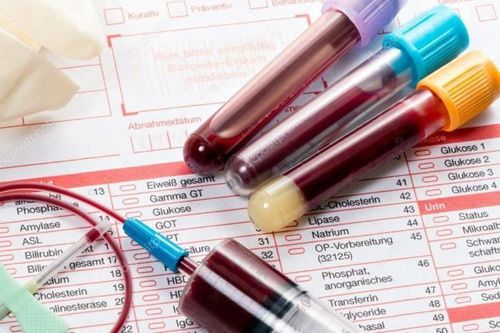
Xét nghiệm máu để định lượng hormone được sản xuất bởi tuyến giáp và tuyến yên
6. Treatment measures
According to statistics, about 80% of patients with postpartum thyroiditis will return to normal after 1 year. Therefore, if the symptoms of the hyperthyroid phase are not clear, no treatment is needed. If symptoms are evident, symptomatic relief with a beta-blocker should be considered.In the hypothyroid phase, no treatment is usually needed. If the hypothyroid phase is prolonged and symptoms of hypothyroidism are evident, treatment with levothyroxine should be discontinued and should be discontinued after 6-9 months of therapy to re-evaluate thyroid status.
In case the patient himself and his family feel too worried about postpartum thyroiditis, they should go to the Endocrinology specialist - Vinmec International General Hospital to be examined and receive the best advice in life. disease prevention and treatment.
Vinmec Hospital owns a system of modern medical equipment, meeting international standards in the diagnosis and treatment of endocrine diseases. In particular, the hospital is the gathering place of a team of highly qualified, experienced and dedicated medical staff.
Please dial HOTLINE for more information or register for an appointment HERE. Download MyVinmec app to make appointments faster and to manage your bookings easily.




